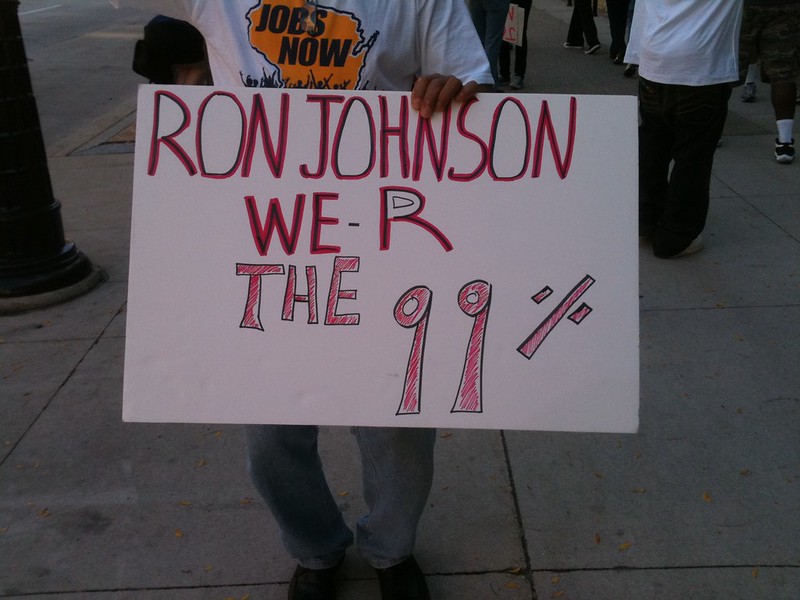Wisconsin’s political history has no shortage of embarrassments, from Joseph McCarthy to modern Republican demagogues like Scott Walker and Reince Priebus. Ron Johnson has contributed to that legacy of shame with gusto. Calls for Johnson’s resignation have begun in response to the role he played in fomenting the violence at the US Capitol building. Johnson’s unwavering support of President Trump appears to be the issue that may finally lead to his political unraveling. However, the policies Johnson has supported during his tenure in the Senate have had an equally detrimental effect on the lives of his constituents and the functioning of our democracy. Examination of his record makes it clear that he has prioritized his own interests, and the interests of his wealthy donors, at the expense of his constituents.
In late 2020, the Senate voted to pass a second stimulus package, which includes a $600 direct payment to American citizens. Many Americans are deeply concerned that the $600 payment was not enough, and representatives on both sides of the aisle — even President Trump — have echoed these concerns following the bill’s passage. The payment was only half of the $1,200 initially included in a bipartisan proposal, primarily due to Johnson, who twice opposed the earlier proposal – which needed unanimous support in the Senate to pass.
Throughout the COVID-19 economic crisis, Johnson’s priorities have remained clear. In addition to reducing the stimulus payments, Johnson sought the inclusion of “liability shields,” in the stimulus package which would have given corporations immunity from lawsuits related to COVID-19. Liability shields put workers at risk by allowing businesses to put them in unsafe conditions with little recourse.
While Johnson opposed additional stimulus payments to the American people, he had no issue with his largest donors taking advantage of stimulus funds. Using FEC campaign contribution data and Accountable.US’s COVID Bailout Tracker, we found 11 business executives who made large donations (above $1,500) to Johnson’s campaign in the past two years whose companies received some form of assistance from the CARES Act. On average, these companies received nearly $1.5 million each. In total, over $16 million in government funds was sent to these companies in 2020, a figure that will surely grow with the passage of the new stimulus package.
Below is a list of Senator Johnson’s donors whose businesses received COVID-19 relief:
| Company | Donor – title | Stimulus amount |
| Russ Darrow Auto Group | Russell Darrow – Chairman and CEO | $7,550,000 |
| RF Technologies | Glenn Jonas – CEO | $2,960,000 |
| Inpro Corporation | Stephen Ziegler – Chairman | $1,800,000 |
| Jor-Mac | Paul Luber – CEO | $1,580,000 |
| Royal Basket Trucks | Thomas Carney – President | $1,050,000 |
| Custom-Pak | Jim Berg – VP/Co-founder | $594,500 |
| Bell Property Management | Ralph Gorenstein – Owner | $235,805 |
| Husch Blackwell | William “Rocky” Fox – Principal | $110,600 |
| The Krizek Group | Ron Krizek – Financial representative | $97,500 |
| Roth Feeder Pigs | Howard Roth – Owner | $80,945 |
| Wisconsin Metalworking | Joseph Kraemer – Owner | $75,921 |
| Total | $16,135,271 |
Earlier in 2020, Johnson downplayed COVID-19, elevated COVID-19 conspiracy theories through a committee hearing, opposed measures incentivizing people to stay home from work to prevent COVID-19 transmission, and expressed concerns that a house bill for paid sick leave would “incentivize people to not show up for work.” All of this while Wisconsin continues to be hit hard by COVID-19. As of January 17th, the state had experienced 566,275 cases and 5,906 deaths.
Johnson’s support of the wealthy at the expense of working people was evident well before the pandemic. He supported the GOP tax cuts projected to increase the federal deficit by $1.9 trillion over the next ten years. For context, a recent study conducted by Cornell University, the UN Food and Agricultural Organization, the International Policy Research Institute, and the International Institute for Sustainable Development found that eliminating world hunger would cost $330 billion over the next ten years. Though Johnson has consistently opposed deficit spending and ran his campaigns on promises to reduce the federal deficit, he shows little concern when he and his corporate donors stand to gain. Johnson personally received $200,000 in tax benefits from the passage of the tax cuts.
Johnson’s hypocrisy reaches far beyond corporate tax benefits. He claimed to oppose the initial stimulus package because he did not want to “mortgage our children’s future.” Still, Johnson’s policy positions have consistently shown a much more cavalier approach when it comes to protecting the global climate for future generations. Johnson is a climate change denier with a 3 percent lifetime score from the League of Conservation Voters. Again, his positions contrast starkly with the views of the majority of Americans – 63 percent feel that stricter environmental regulations are worth the potential costs.
The events of the past week have shook the foundation of American Democracy and have rightfully led to calls from across the political spectrum for accountability for leaders who stoked the violence – including Ron Johnson. This is necessary, but as we move forward into a new administration, we must continue to understand the various other insidious ways in which political leaders on both sides of the aisle seek to undermine the democratic process, including through corporate influence. Ron Johnson’s policy positions made him an unfit Senator long before the events of January 6th. Before he sold out American Democracy in favor of President Trump, he had already sold out the people of Wisconsin in favor of wealthy donors and big corporations.
Header image: “Rally for Answers from Ron Johnson 10-12-2011” by WisconsinJobsNow is licensed under CC BY-NC 2.0
